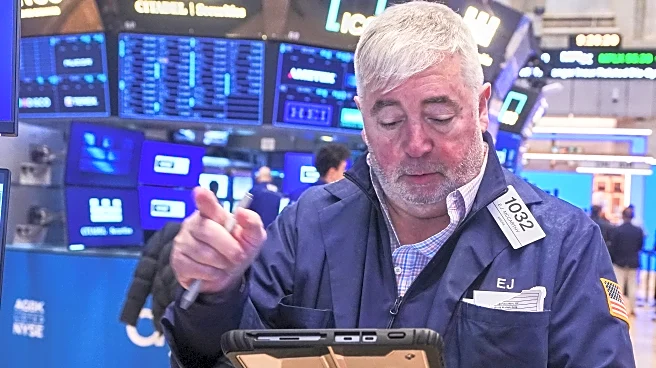What's Happening?
The U.S. Senate has initiated procedural steps to end the federal government shutdown, which has become the longest in history. A test vote was conducted late Sunday, aiming to pass compromise legislation to fund the government. The Senate may vote by
mid-December on extending expiring health care tax credits, a key issue in the negotiations. The shutdown has delayed crucial economic data, affecting Wall Street's ability to make informed decisions. Meanwhile, global markets, including European and Asian shares, have advanced, driven by a rebound in technology stocks. The S&P 500 futures rose by 0.7%, and the Dow Jones Industrial Average futures increased by 0.1%, reflecting optimism about a potential resolution to the shutdown.
Why It's Important?
The government shutdown has significant implications for the U.S. economy, delaying key economic data on inflation and employment. This data is crucial for traders and the Federal Reserve in making investment and policy decisions. The lack of employment data is particularly concerning due to a weakening job market. The Federal Reserve has already cut interest rates twice this year to stimulate economic growth, but further cuts could exacerbate inflation. The Senate's actions to end the shutdown are critical in restoring access to economic data and stabilizing market conditions. The global market rebound, led by technology stocks, indicates investor confidence in a resolution, which could positively impact U.S. industries and economic stakeholders.
What's Next?
The Senate's procedural maneuvers could lead to a vote on compromise legislation to fund the government, potentially ending the shutdown. If successful, this would restore access to delayed economic data, allowing the Federal Reserve and Wall Street to make more informed decisions. The Senate may also address health care tax credits, which are a sticking point in negotiations. The Federal Reserve's December meeting is anticipated, with Wall Street betting on further interest rate cuts. These developments will be closely watched by political leaders, businesses, and civil society groups, as they could influence economic policy and market stability.
Beyond the Headlines
The prolonged government shutdown highlights deeper issues in U.S. political negotiations and governance. The delay in economic data underscores the reliance on government transparency for market stability. The situation raises ethical questions about the impact of political stalemates on public policy and economic health. Long-term shifts in political strategy and economic forecasting may be triggered by this event, influencing future legislative approaches to government funding and economic management.

















